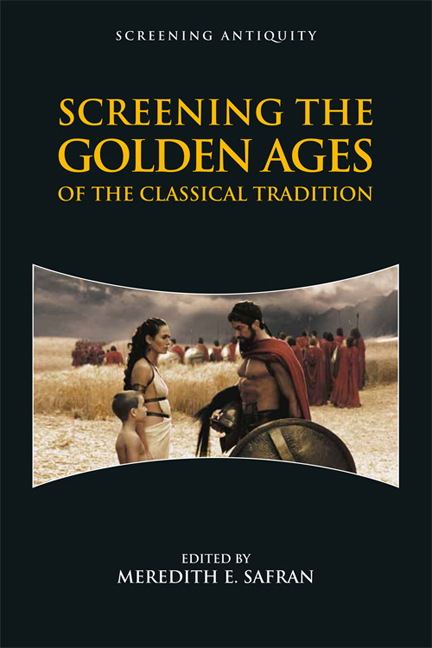Book contents
- Frontmatter
- Contents
- Series Editors’ Preface
- Editor's Acknowledgments
- Contributors
- Illustrations
- Abbreviations
- Introduction: Searching for Gold in an Age of Iron
- PART I THE GLORY THAT WAS GREECE
- 1 Re-(en)gendering Heroism: Reflective Nostalgia for Peplum's Golden Age of Heroes in Hercules: The Legendary Journeys 2.14 (1996)
- 2 Kissed by the Muse of Roller-Disco: Utopia versus the Golden Ages of America, Hollywood, and Classical Myth in Xanadu (1980)
- 3 Gilding American History through Song Culture in O Brother, Where Art Thou? (2000)
- 4 A Leonidas for the Golden Age of Superhero Films: The Thermopylae Tradition in 300 (2006)
- 5 The Dueling Greek Golden Ages of 300: Rise of an Empire (2014)
- 6 Confronting the Ancient Greek Golden Age in Jules Dassin's Phaedra (1962)
- 7 Pericles, Cincinnatus, and Zombies: Classicizing Nostalgia in The Walking Dead (2010–)
- PART II THE GRANDEUR THAT WAS ROME
- Filmography
- Bibliography
- Index
3 - Gilding American History through Song Culture in O Brother, Where Art Thou? (2000)
from PART I - THE GLORY THAT WAS GREECE
Published online by Cambridge University Press: 23 November 2019
- Frontmatter
- Contents
- Series Editors’ Preface
- Editor's Acknowledgments
- Contributors
- Illustrations
- Abbreviations
- Introduction: Searching for Gold in an Age of Iron
- PART I THE GLORY THAT WAS GREECE
- 1 Re-(en)gendering Heroism: Reflective Nostalgia for Peplum's Golden Age of Heroes in Hercules: The Legendary Journeys 2.14 (1996)
- 2 Kissed by the Muse of Roller-Disco: Utopia versus the Golden Ages of America, Hollywood, and Classical Myth in Xanadu (1980)
- 3 Gilding American History through Song Culture in O Brother, Where Art Thou? (2000)
- 4 A Leonidas for the Golden Age of Superhero Films: The Thermopylae Tradition in 300 (2006)
- 5 The Dueling Greek Golden Ages of 300: Rise of an Empire (2014)
- 6 Confronting the Ancient Greek Golden Age in Jules Dassin's Phaedra (1962)
- 7 Pericles, Cincinnatus, and Zombies: Classicizing Nostalgia in The Walking Dead (2010–)
- PART II THE GRANDEUR THAT WAS ROME
- Filmography
- Bibliography
- Index
Summary
Joel and Ethan Coen's 2000 film O Brother, Where Art Thou? offers a romanticizing depiction of the Depression-era American South, reflecting the filmmakers’ penchant for exploring the ways in which iconic American pasts are remembered within popular culture. Within their oeuvre, this film is remarkable in two respects: its thorough integration of music into the narrative, and the fact that it is modeled on a classical text, Homer's Odyssey. This fact is stated explicitly in the first frames of the opening sequence, by displaying a translation of the epic's first lines; this sequence concludes with a credit reading “Based upon ‘The Odyssey’ by Homer.” The Coens have been famously coy about their knowledge of the Odyssey and the degree to which it shapes the film. Yet they have acknowledged a relationship between the Odyssey and the film's music, confirming in at least one interview that Homeric poetry and the music of the film resemble each other at a fundamental level: “They are verbal traditions. Oral traditions.”
Although numerous scholars have analyzed the film's treatment of the Odyssey, casting doubt on the filmmakers’ professedly casual engagement with the text, much remains to be said regarding the film's engagement with the Odyssey vis-à-vis its use of song to generate its gilded rendering of the American Southern past. Analysis of the film's music reveals that the relationship between the Homeric world and that of the film stems from the Coens’ recognition that “golden” eras are, at least in part, generated and remembered through the legacy of song, in both classical and modern cultures. In fact, the film is not set in a historically accurate rendering of the pre-modern South, but in modernity's nostalgia-laden (mis)remembering of it, which is constructed largely through song – just as Greek cultural memory of the mythical Trojan War and its aftermath was constructed.
While several scholars have written on the movie's use of music, O Brother also highlights how technological change affected American folk-song tradition through recording – a phenomenon similar to that which changed the Greek song culture into “Homeric” epic. This focus on a moment of epochal change allows the filmmakers to undercut the notion that folk music is a simple and genuine artifact of the past.
- Type
- Chapter
- Information
- Screening the Golden Ages of the Classical Tradition , pp. 65 - 82Publisher: Edinburgh University PressPrint publication year: 2018



